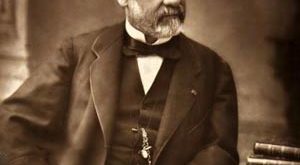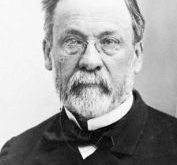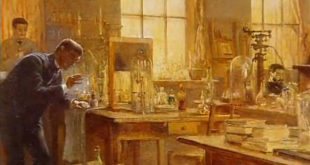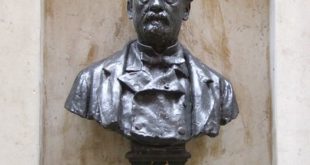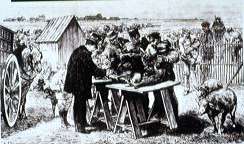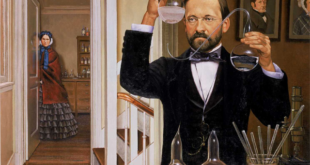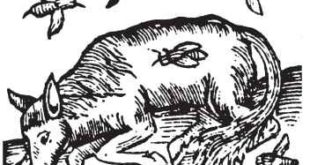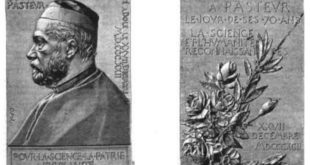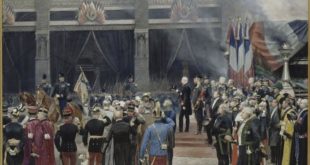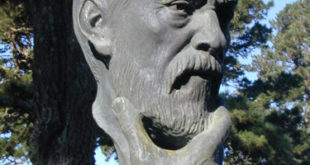Many have attacked Louis Pasteur as a man who denied God’s existence and others have gone as far to say he was a devout Catholic his whole life. In my humble opinion, he was somewhere in between.Pasteur was a spiritual man and recognized the need for religion, as many times he would rely on faith alone to keep his work …
Read More »Articles
Poem – For Louis Pasteur
by Edgar Bowers, 1924 – 2000 How shall a generation know its story If it will know no other? When, among The scoffers at the Institute, Pasteur Heard one deny the cause of child-birth fever, Indignantly he drew upon the blackboard, For all to see, the Streptococcus chain. His mind was like Odysseus and Plato Exploring a new cosmos in …
Read More »Investigation into the role attributed to atmospheric oxygen gas in the destruction of animal and vegetable substances after death
The most ordinary observation has at all times demonstrated that animal and vegetable substances, exposed after death to contact with atmospheric air, or buried in the earth, disappear, in consequence of various transformations. Fermentation, putrefaction, and slow combustion, are the three phenomena which concur in the accomplishment of this great fact of the destruction of organic substances–a condition necessary for …
Read More »Pasteur of France
Originally published in “The Rotarian” magazine in June, 1937 A little more than a century ago—December 27, 1822—in, the humble dwelling of a tanner in Dôle, France, a child was born who was destined to create new sciences, to transform industries, and to bring the greatest relief to human miseries: Louis Pasteur. Pasteur had just graduated from the Ecole Normale …
Read More »Vaccine Milestones: Louis Pasteur
In the last quarter of the 19th century, scientists identified bacteria as the cause of many diseases, including cholera, typhoid fever, anthrax, plague, diphtheria, and tuberculosis. In France microbiologist and chemist Louis Pasteur had noticed that cultures of fowl cholera lost their virulence if they were left inactive for two weeks. When chickens were inoculated with the old cultures, they …
Read More »The Attenuation of the Causal Agent of Fowl Cholera
Originally published by Louis Pasteur in 1880 I would like to reiterate the following results, which I have previously had the honor of presenting to the academy: Fowl cholera is a virulent disease of the first order. The virus* consists of a microscopic parasite which multiplies readily in culture away from the animal body. From this it is possible to …
Read More »Spontaneous Generation and the Origin of Life
This article was originally published on The Talk Origins Archive on April 26, 2004. Summary What Louis Pasteur and the others who denied spontaneous generation demonstrated is that life does not currently spontaneously arise in complex form from nonlife in nature; he did not demonstrate the impossibility of life arising in simple form from nonlife by way of a long …
Read More »Pasteur Seventy Years Old: Presented with the Gold Medal of the Academy of Sciences
Originally published in the New York Times on December 27, 1892 PARIS, Dec. 27. — The scientific and literary world of Paris assembled to-day to honor Louis Pasteur for the benefits he has conferred upon humanity. The spacious amphitheatre of the Sorhonne, the home of the French Academy of Sciences, was uncomfortably packed by persons eager to take part in …
Read More »Funeral of Pasteur: Last Rites Observed in Cathedral of Notre Dame
Originally published in the Boston Evening Transcript on October 5, 1895 Paris, Oct. 5–The funeral services over the body of Professor Louis Pasteur, the famous chemist and scientist, took place in the Cathedral of Notre Dame this afternoon. The coffin was removed from the Pasteur Institute, where the body had been lying in state, at ten o’clock and placed upon …
Read More »Louis Pasteur Honored Abroad
Originally published by the Spokane Daily Chronicle on December 27, 1922 PARIS, Dec 26.–(By the Associated Press.)–The centenary of the birth of Louis Pasteur was observed today by the Academy of Medicine with exercises in honor of the world-famous chemist and biologist, one of the academy’s most illustrious members. Pasteur was elected to the academy in 1873 as a free …
Read More » Pasteur Brewing Louis Pasteur – Science, Health, and Brewing
Pasteur Brewing Louis Pasteur – Science, Health, and Brewing 